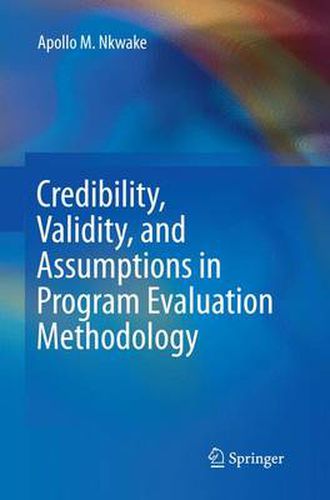Readings Newsletter
Become a Readings Member to make your shopping experience even easier.
Sign in or sign up for free!
You’re not far away from qualifying for FREE standard shipping within Australia
You’ve qualified for FREE standard shipping within Australia
The cart is loading…






This title is printed to order. This book may have been self-published. If so, we cannot guarantee the quality of the content. In the main most books will have gone through the editing process however some may not. We therefore suggest that you be aware of this before ordering this book. If in doubt check either the author or publisher’s details as we are unable to accept any returns unless they are faulty. Please contact us if you have any questions.
This book focuses on assumptions underlying methods choice in program evaluation. Credible program evaluation extends beyond the accuracy of research designs to include arguments justifying the appropriateness of methods. An important part of this justification is explaining the assumptions made about the validity of methods. This book provides a framework for understanding methodological assumptions, identifying the decisions made at each stage of the evaluation process, the major forms of validity affected by those decisions, and the preconditions for and assumptions about those validities.
Though the selection of appropriate research methodology is not a new topic within social development research, previous publications suggest only advantages and disadvantages of using various methods and when to use them. This book goes beyond other publications to analyze the assumptions underlying actual methodological choices in evaluation studies and how these eventually influence evaluation quality. The analysis offered is supported by a collation of assumptions collected from a case study of 34 evaluations. Due to its in-depth analysis, strong theoretical basis, and practice examples, Credibility, Validity and Assumptions is a must-have resource for researchers, students, university professors and practitioners in program evaluation. Importantly, it provides tools for the application of appropriate research methods in program evaluation
$9.00 standard shipping within Australia
FREE standard shipping within Australia for orders over $100.00
Express & International shipping calculated at checkout
This title is printed to order. This book may have been self-published. If so, we cannot guarantee the quality of the content. In the main most books will have gone through the editing process however some may not. We therefore suggest that you be aware of this before ordering this book. If in doubt check either the author or publisher’s details as we are unable to accept any returns unless they are faulty. Please contact us if you have any questions.
This book focuses on assumptions underlying methods choice in program evaluation. Credible program evaluation extends beyond the accuracy of research designs to include arguments justifying the appropriateness of methods. An important part of this justification is explaining the assumptions made about the validity of methods. This book provides a framework for understanding methodological assumptions, identifying the decisions made at each stage of the evaluation process, the major forms of validity affected by those decisions, and the preconditions for and assumptions about those validities.
Though the selection of appropriate research methodology is not a new topic within social development research, previous publications suggest only advantages and disadvantages of using various methods and when to use them. This book goes beyond other publications to analyze the assumptions underlying actual methodological choices in evaluation studies and how these eventually influence evaluation quality. The analysis offered is supported by a collation of assumptions collected from a case study of 34 evaluations. Due to its in-depth analysis, strong theoretical basis, and practice examples, Credibility, Validity and Assumptions is a must-have resource for researchers, students, university professors and practitioners in program evaluation. Importantly, it provides tools for the application of appropriate research methods in program evaluation